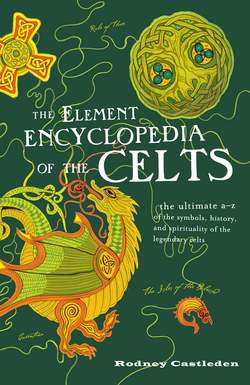Читать книгу The Element Encyclopedia of the Celts - Rodney Castleden - Страница 102
COLUMBA OF IONA
ОглавлениеColumba was born a prince of the northern Ui Neill in 521. Two of his first cousins became kings during his lifetime, and he himself was eligible for kingship. When he was in his twenties, he was hostile to the overriding influence of the (non-aristocratic) Ciaran of Clonmacnoise.
Columba is said to have founded around 40 monastic houses in Ireland: the first at Derry, close to the dynastic home of his family at Ailech.
Without permission, he copied the Gospel Book of Finnian belonging to Moville, who sought judgment against him from King Diarmait. Diarmait had executed the King of Connacht’s son, who had killed a youth while playing games and who had sought sanctuary with Columba. Columba rallied the monks and the regional kings of Ireland against Diarmait’s centralized and tyrannical rule. He also won a military victory against him at the bloody battle of Cuil Dremhne in 563.
The consequence was exile, imposed on Columba by a monastic synod that deplored the involvement of monks in political warfare. This is how Columba arrived at Iona.
Once there, Columba converted Brudeus or Bridei, King of the Picts, and consecrated Aedan, King of the Scots, at Dal Riada. He appointed monks as bishops to communities in Britain; as monks, they remained under Columba’s authority. He visited Ireland several times, and also the Irish colonists in Dal Riada in Britain; he made at least two journeys to visit the northern Picts, where Bridei had enormous respect for him.
Overall, Columba had enormous influence over the development of the Church in northern Britain and Ireland. He also wielded considerable political power, and it was probably his influence that kept the northern kingdoms at peace with one another.
